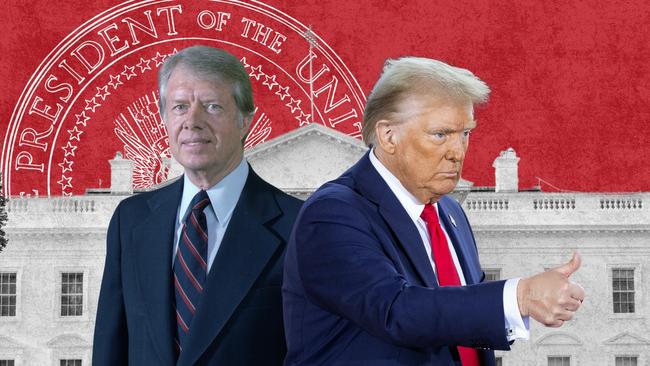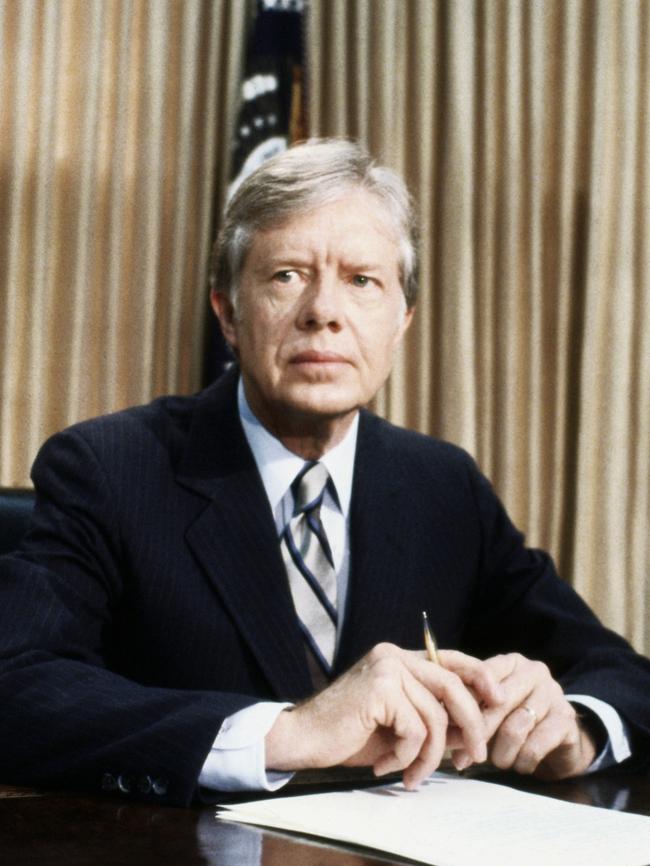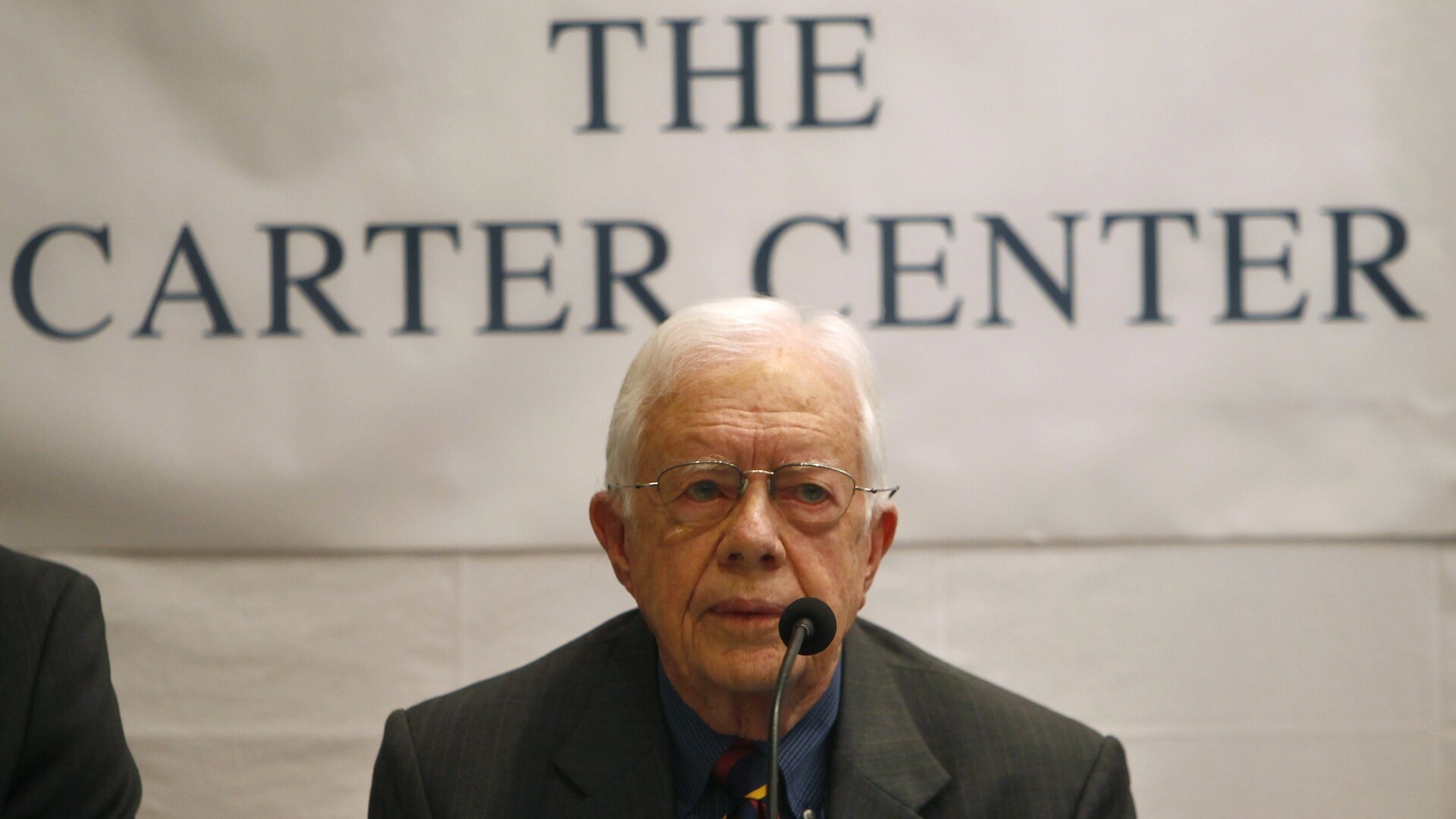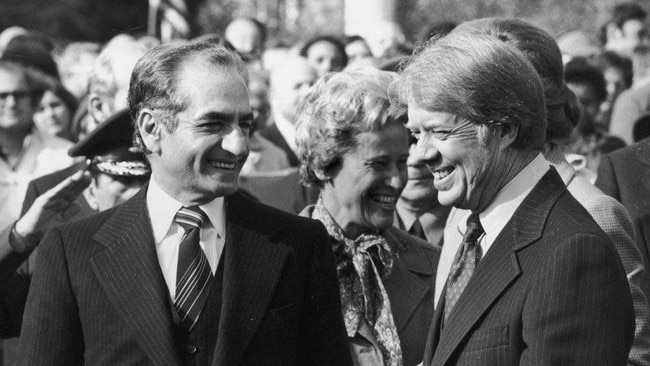
While Trump is an instinctive, gut-driven leader, this does not mean he has no compass. If that compass has one face on it, it is Carter’s. For decades, Trump has been asking “What would Carter do?”, working out what that might be, then doing the opposite.
Where Carter appeased, Trump would threaten. Where Carter dithered, Trump would act. Where Carter finger-wagged, Trump would fist-pump. Where Carter was weak, Trump would be strong.
These are simple precepts. They have sustained Trump’s leadership style from boardroom to television studio to Oval Office.
The overcomplications of Carter would be solved by the simplicity of executive power under Trump. Carter tried to micromanage everything.

He was famously involved in the purchasing of the White House’s styrofoam cups. Of the 85 Federalist Papers, none covers that use of presidential power.
Trump is not a details man. He invites chaos and encourages churn. The staff turnover in his first term was legendary. He never trusted any one cabinet member very long. He liked to watch them fight among themselves. His administration was undeniably his. Elon Musk, take note.
Again, Carter was the opposite. His cardiganed collegiality was warm but ineffective. He chose big characters to run his foreign policy, such as Zbigniew Brzezinski and Cyrus Vance, men who had a deep dislike for each other. But he could not choose between them.
Carter inadvertently fostered tension without any resulting creativity. His decision to attempt a rescue of Americans at the US embassy in Tehran during the Iranian hostage crisis was taken while Vance, his secretary of state, was on vacation.
In the months preceding this, the Carter administration pursued every kind of back channel into revolutionary Iran. None paid off. This bizarre tale is told brilliantly by Gary Sick in his book All Fall Down: America’s Tragic Encounter with Iran.
Compare the approach of both presidents to Iran. In 1980, Carter jumped through every hoop to find a peaceful solution to the kidnapping by student revolutionaries of 52 American diplomats. In 2020, Qassem Soleimani, the Iranian shadow commander radicalised by that undergraduate humiliation of the US, was coldly assassinated on Trump’s orders.

Trump accompanied this with the tweet: “WARNING that if Iran strikes any Americans, or American assets, we have 52 Iranian sites (representing the 52 American hostages taken by Iran many years ago), some at a very high level & important to Iran & the Iranian culture, and those targets, and Iran itself, WILL BE HIT VERY FAST AND VERY HARD.”
“If you’re Donald Trump,” said Stephen Metcalf, historian of the period, “it’s always 1979. Mr Trump carries Mr Carter with him everywhere, as a kind of anti-self. If Mr Carter was deliberative, Mr Trump must be reactive; where Mr Carter was essentially sermonic, a devotee of Reinhold Niebuhr, the great theologian of human limits, Mr Trump is comedic-demagogic, a fan of Norman Vincent Peale, the pop-evangelist behind ‘positive thinking’.’’
We are used to seeing Bidenomics as Trump’s opposite; it was the precondition for Trump’s remarkable victory in November.
But the economy Trump had to make his way in as a budding property developer was Carter’s. This made the Biden years look prosperous. Stuff that cost the 30-year-old Trump $100,000 in 1976 (when Carter was elected) cost the 34-year-old Trump $150,000 in 1980 (when Carter lost re-election).
Trump’s formative experience was the Carter recession, oil shock, stagflation and a world of foreigners who seemed, to the New Yorker, complicit in US decline. This was when Trump’s world view was formed. He has varied from it hardly at all. To get Trump, we need to appreciate how he got Carter.

Certainly, not every Carter misstep has been met by a Trump correction. Both men, to the chagrin of foreign policy hawks, believed in peaceful coexistence with Russia. Carter was no fan of Israel. But, like Trump, he engineered a peace agreement with Arab regimes that left the world’s only Jewish state more secure. But then most US presidents of the modern era have shared these approaches.
Ultimately, what makes Trump the anti-Carter is the president-elect’s rejection of the woolly progressivism espoused by his hapless predecessor.
Carter, in good and deep faith, pushed social justice and human rights as fundamental causes of American power. Their seizure by the educated elite, and the whole woke revolution built on them, is what Trump intends to wind back.
Perhaps the crucial lesson Trump took from Carter was to be lucky. It is hard to contrive a less auspicious period of modern history in which to be a one-term president. Carter was a poor leader but he got bum luck. Until Covid, Trump was the luckiest president since Bill Clinton. He will hope this luck returns in a second term – and Iran will hope it doesn’t.
Timothy J. Lynch is professor of American politics at the University of Melbourne and author of In the Shadow of the Cold War: US Foreign Policy from George Bush Sr to Donald Trump (Cambridge University Press, 2020).







Donald Trump is about to become the 47th president of the United States – but that is only if you count Jimmy Carter. The 39th president was one of the worst. Trump, then in his early 30s, watched and learned. No former president taught Trump more about the office than did Carter. The returning president is the anti-Carter.